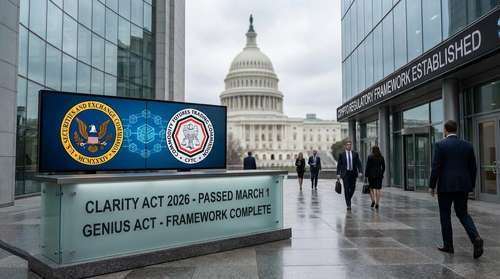In a dramatic twist that could shake up the regulatory landscape, Ian McGinley, the enforcement director at the Commodity Futures Trading Commission (CFTC), has decided to exit stage left just before President-elect Donald Trump takes office. It's like the final act of a gripping play, leaving audiences wondering what the next scene will bring.
McGinley has been the linchpin in several high-profile enforcement actions, particularly in the burgeoning world of cryptocurrency. His departure signals a potential shift in the CFTC's approach, opening the floodgates for a fresh Republican strategy on digital assets. But what does this mean for the future of crypto regulation in the U.S.? Let's dive in!
The Man Behind The Curtain: Ian McGinley's Legacy
Ian McGinley has been a formidable force in the CFTC, wielding his expertise like a maestro conducting a symphony. With a focus on the crypto universe, McGinley spearheaded landmark cases against big names like Binance and KuCoin. His efforts haven't gone unnoticed, drawing both applause and criticism from various corners of the financial world.
“McGinley was a visionary,” one insider noted, emphasizing his knack for navigating the murky waters of crypto regulation. His departure is akin to losing the captain of a ship just as storm clouds gather on the horizon.
His role wasn't just about enforcement; it was about setting the tone for how the CFTC engaged with the rapidly evolving digital assets space. Imagine trying to catch a comet with a butterfly net—that's the challenge McGinley faced, and many say he did it with aplomb.
Trump's Arrival: A New Dawn or Dusk?
With McGinley's exit, the stage is set for the incoming Trump administration to put its stamp on the CFTC. The word on the street is that Republicans are keen to shake things up, particularly in how digital assets are regulated. The Financial Conduct Authority and the Financial Services Commission are watching closely, as their U.S. counterpart navigates these uncharted waters.
Trump's administration might view the crypto world as the Wild West, a frontier ripe for exploration but also fraught with peril. Will they tighten the reins or let the horses run free? Only time will tell.
“Every administration brings its own flavor to financial regulation,” an analyst remarked. With the Bank Regulation Act, the Bank Secrecy Act, and the Conference of State Bank Supervisors all in play, the stakes couldn't be higher. It's a delicate dance of power and policy.
The Ripple Effect on Crypto Regulations
The crypto community is buzzing with speculation. McGinley's departure could lead to a more lenient approach, or it could mean stricter oversight—like a game of regulatory roulette. The Financial Crimes Enforcement Network (FinCEN) and the FCA banks are all keeping a close eye on these developments.
For crypto enthusiasts and investors, this transition period is both exhilarating and nerve-wracking. Ever wonder how it feels to be on a roller coaster with no brakes? That's the current sentiment in the crypto space.
As the CFTC's regulatory agenda potentially shifts, companies dealing with digital assets might need to rethink their strategies. Adaptability will be key in this dynamic landscape. After all, in the world of finance, the only constant is change.
Looking Ahead: What Lies Beyond the Horizon?
As we stand on the cusp of a new era, the question looms large: What will the future hold for the CFTC and its approach to cryptocurrencies? With McGinley's exit, there's a palpable sense of anticipation, akin to waiting for the next big act in a blockbuster movie.
Some see this as a golden opportunity for the CFTC to innovate and lead the charge in global crypto regulation. Others worry about the potential for increased volatility and uncertainty. It's a high-stakes game, and the players are just getting started.
In the end, whether this marks the dawn of a new age or the beginning of a tumultuous chapter, one thing is clear: the world will be watching closely as the next chapter of U.S. crypto regulation unfolds.




